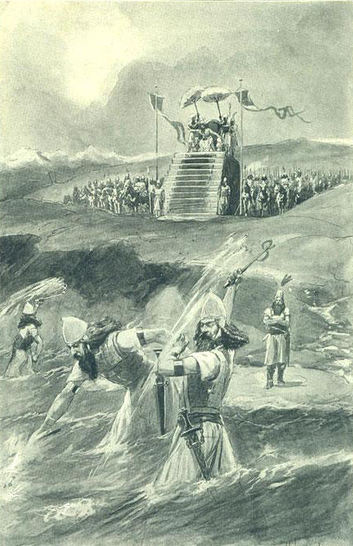
When Xerxes, an ancient Persian King, was gifted the throne at age 36, he soon set his eyes on Greece, hoping to enslave the mightiest city-states of Athens and Sparta just as he had Babylon and Egypt. He marched his enormous slave army into the Mediterranean region, but an unforeseen obstacle emerged before him: the Hellespont River. The river's swift current and stormy weather destroyed his pontoons and bridges. So what did Xerxes do?
He ordered his men to lash the river with whips and cast iron chains into its depths, as if his anger would somehow conquer the river into subjugation. This is the epitome of a deadly mindset. Instead of immediately repairing or creating new pontoons and bridges, he threw a temper tantrum against an inanimate object, because it wouldn't obey his wish. And it cost him the war.
The time Xerxes wasted before managing to repair his pontoons was the window of opportunity that Greece needed. A company of 300 Spartans and 200 Athenians rushed to intercept the horde at Thermopylae. Why Thermoplyae? Because the Greeks recognized what Xerxes refused to: that no amount of wishing would change reality: in this case, the fact that a narrow mountain pass at Thermopylae was the only way into open countryside, which Xerxes' army needed to move freely and plunder for supplies. The Greeks allied with the terrain and transformed it to their advantage. There in the pass they would be virtually unflankable and only fight a handful of enemies at once.
The strategy worked. Though the Spartans and Athenians were all eventually killed, they succeeded at holding off an army that some historians believe to be 100 times their size. Their ability to see the context saved their friends and families, most of Greece and perhaps all of Western Civilization from enslavement. By repelling Xerxes and killing thousands of his warriors, they bought time for Sparta and Athens to muster their own armies and defend their homeland.
There's no substitute for the facts. All the prayers and well-wishing, and blind optimism won't change your circumstances. They're an obstacle to success. See the truth of a situation and act accordingly. Learn what is within your power to affect and what isn't.
There's an old Spanish proverb that I think says it best:
Take what you want and pay for it.
He ordered his men to lash the river with whips and cast iron chains into its depths, as if his anger would somehow conquer the river into subjugation. This is the epitome of a deadly mindset. Instead of immediately repairing or creating new pontoons and bridges, he threw a temper tantrum against an inanimate object, because it wouldn't obey his wish. And it cost him the war.
The time Xerxes wasted before managing to repair his pontoons was the window of opportunity that Greece needed. A company of 300 Spartans and 200 Athenians rushed to intercept the horde at Thermopylae. Why Thermoplyae? Because the Greeks recognized what Xerxes refused to: that no amount of wishing would change reality: in this case, the fact that a narrow mountain pass at Thermopylae was the only way into open countryside, which Xerxes' army needed to move freely and plunder for supplies. The Greeks allied with the terrain and transformed it to their advantage. There in the pass they would be virtually unflankable and only fight a handful of enemies at once.
The strategy worked. Though the Spartans and Athenians were all eventually killed, they succeeded at holding off an army that some historians believe to be 100 times their size. Their ability to see the context saved their friends and families, most of Greece and perhaps all of Western Civilization from enslavement. By repelling Xerxes and killing thousands of his warriors, they bought time for Sparta and Athens to muster their own armies and defend their homeland.
There's no substitute for the facts. All the prayers and well-wishing, and blind optimism won't change your circumstances. They're an obstacle to success. See the truth of a situation and act accordingly. Learn what is within your power to affect and what isn't.
There's an old Spanish proverb that I think says it best:
Take what you want and pay for it.


















